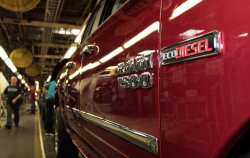— Fiat Chrysler Automobiles (FCA US) has been sued by the U.S. Department of Justice on behalf of the Environmental Protection Agency (EPA) for allegedly selling 104,000 Ram 1500 and Jeep Grand Cherokee SUVs equipped with illegal emissions software.
Just days ago, Chrysler filed an application with the government proposing a fix for the SUVs and likely hoping that action would erase any talk of a federal lawsuit. Apparently it didn't work, as federal prosecutors aim to collect more than $4 billion from the automaker if the maximum penalties are applied.
Prosecutors says the 3-liter EcoDiesel trucks and SUVs have emissions control software the government knew nothing about because Chrysler didn't tell regulators, a violation of federal laws.
In January 2017, the EPA and the California Air Resources Board (CARB) issued notices of emissions violations to Fiat Chrysler for alleged violations of the Clean Air Act, alleging the automaker concealed software in 2014-2016 Jeep Grand Cherokee SUVs and Ram 1500 trucks equipped with EcoDiesel engines.
Calling them "auxiliary emission control devices," federal regulators say the software is legally allowed in some situations, such as during extreme driving conditions that could damage the engines.
Officials were first suspicious when they changed the emissions tests due to Volkswagen fooling the world for years. The expanded tests were used on the Ram and Jeep vehicles and allegedly showed the devices were there, but the automaker had never declared the software existed before selling the vehicles.
Automakers must go through a certification process showing their vehicles meet federal emissions standards and part of the process requires automakers to explain and disclose any software that may alter how vehicles emit air pollution. Failing to do this will mean automatic violations of the Clean Air Act.
The Act requires that automakers disclose all auxiliary emission control devices, explain why the devices exist and show how the devices affect emissions. If an automaker can show evidence the software isn't a "defeat device" to fool emissions tests, the auxiliary devices are considered legal. But if the devices are considered defeat devices, the vehicles cannot be sold in the U.S.
Prosecutors charge Chrysler with using eight of the devices that were never disclosed before the vehicles were certified. The EPA says the software decreases emissions controls during "normal driving" situations that results in the vehicles passing tests on machines. However, once back on the road, the trucks and SUVs allegedly emit nitrogen oxides at levels beyond legal EPA limits.
The lawsuit alleges all 104,000 Ram and Jeep vehicles are different than the vehicle specifications provided to the EPA to certify the vehicles for sale, leaving the vehicles currently uncertified and in violation of the law.
In alleging the vehicles contain defeat devices, prosecutors claim one or more of the eight undisclosed software features, alone or in combination with the others, "defeats" the emission control systems, a charge Chrysler adamantly denies.
FCA responded by saying it is disappointed the government chose to file the lawsuit because the automaker had offered to update the emissions software calibrations that will allegedly fix any problems. Chrysler says it has spent months testing the trucks and SUVs to create a remedy that will work to improve emissions performance without affecting fuel efficiency.
The automaker says it denies defeat devices were installed on the vehicles to scheme customers or regulators and it will vigorously defend itself in court.
Attorneys will fight over what is and is not a "defeat device," but FCA will still be hard-pressed to answer why it didn't disclose eight allegedly legal software devices when the trucks and SUVs were certified.

